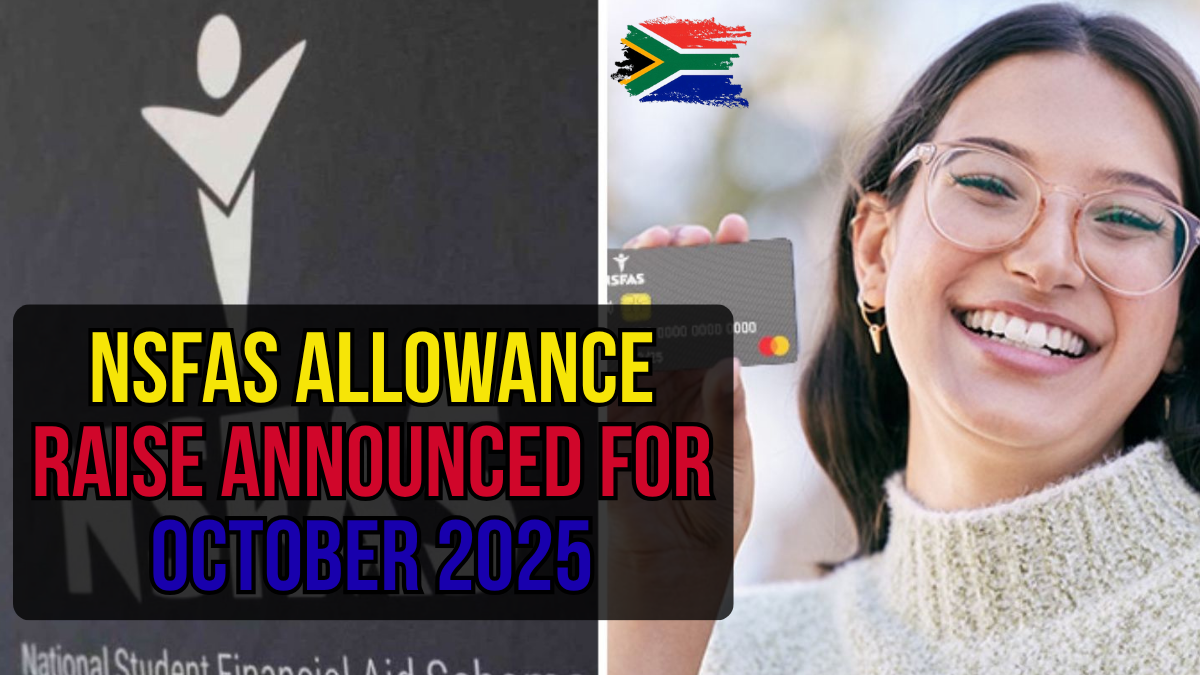South African students have reason to celebrate as the National Student Financial Aid Scheme announces substantial increases to student allowances for 2025. The NSFAS allowance increase addresses mounting concerns about the rising cost of living and its impact on higher education accessibility.

These funding adjustments represent the most significant boost to student financial support in recent years. With accommodation costs climbing and basic necessities becoming increasingly expensive, the timing couldn’t be more critical for thousands of students who depend on NSFAS to pursue their educational goals.
The increases affect multiple categories of support, from housing and meals to learning materials and transportation. Students can expect to see these enhanced rates reflected in their accounts starting October 2025, providing much-needed relief during a challenging economic period.
Understanding the New NSFAS Allowance Rates
The 2025 NSFAS allowance increase brings meaningful improvements across all major expense categories. Students will see the most substantial boosts in areas where costs have risen most dramatically over the past year.
Accommodation Allowance Changes
Housing costs have skyrocketed near university campuses, making the accommodation allowance increase from R61,500 to R65,000 particularly welcome. This R3,500 boost helps bridge the gap between what students receive and what they actually pay for decent housing.
The increase recognizes that safe, suitable accommodation is fundamental to academic success. Students struggling to afford rent can now access housing closer to campus, reducing commute times and improving study conditions.
Meal and Living Allowance Updates
Food security remains a pressing concern for many students. The meal allowance increase from R16,500 to R18,000 provides an additional R1,500 annually for nutrition and basic living expenses.
This enhancement acknowledges that proper nutrition directly impacts academic performance. Students who previously skipped meals or relied on inadequate food sources can now maintain healthier eating patterns throughout their studies.
Learning Materials Support
The learning materials allowance grows from R5,200 to R5,800, reflecting the rising costs of textbooks, technology, and educational resources. This R600 increase may seem modest, but it can cover essential items like study guides, stationery, or software subscriptions.
Digital learning tools have become increasingly important, and this allowance helps students access the technology they need to succeed in modern educational environments.
Transportation Assistance
Students living at home while attending university will benefit from the transport allowance increase to R8,200, up from R7,500. This R700 boost helps offset rising fuel costs and public transportation fare increases.
Reliable transportation ensures students can attend classes consistently and participate fully in their educational programs without financial stress impacting their attendance.
Eligibility Requirements for Enhanced Funding
The NSFAS allowance increase applies automatically to eligible students without requiring new applications. However, maintaining access to these enhanced funds requires meeting specific criteria.
Students must remain enrolled at public universities or Technical and Vocational Education and Training (TVET) colleges. The funding specifically targets South African citizens whose household income falls below established NSFAS thresholds.
Academic performance standards continue to apply. Students must maintain satisfactory progress in their studies to retain funding eligibility. This ensures that enhanced allowances support serious academic commitment while providing necessary financial relief.
Regular reviews of student status occur throughout the academic year. Students should stay informed about their academic standing and notify NSFAS of any changes that might affect their eligibility for continued support.
Impact on Student Financial Wellbeing
The NSFAS allowance increase addresses real challenges students face daily. Rising living costs have forced many to make difficult choices between basic necessities and educational requirements.
Enhanced funding allows students to focus more energy on studying rather than worrying about meeting basic needs. This shift can significantly improve academic outcomes and graduation rates among financially disadvantaged students.
The increases also reduce the likelihood of students dropping out due to financial pressure. By providing more realistic support levels, NSFAS helps ensure that talented students can complete their programs regardless of economic background.

Strategic Use of Increased Allowances
Students should approach their enhanced allowances strategically to maximize educational benefits. The increases provide opportunities to invest in long-term academic success rather than just covering immediate expenses.
Housing and Accommodation Planning
The larger accommodation allowance enables students to secure better housing arrangements. Proximity to campus, safety features, and study-conducive environments become more accessible with the increased funding.
Students might consider shared housing arrangements that offer both cost savings and social support. The additional allowance provides flexibility to choose housing that truly supports academic goals.
Nutritional Investment
The enhanced meal allowance opens doors to better nutrition planning. Students can invest in healthier food options, meal planning, or even basic cooking equipment for long-term savings.
Proper nutrition supports cognitive function and overall health, making this allowance increase particularly valuable for academic performance. Students should prioritize balanced meals over convenience foods when possible.
Educational Technology and Resources
Learning materials funding can now stretch to cover more comprehensive educational needs. Students might invest in laptops, software, or online learning platforms that provide lasting educational value.
Digital resources often offer better long-term value than traditional textbooks. The increased allowance enables students to build personal libraries of educational materials they can reference throughout their careers.
Timeline and Implementation
The October 2025 implementation date gives students time to plan for the enhanced funding. Current NSFAS recipients should prepare for the automatic adjustment to their allowances.
Students should monitor their NSFAS accounts and communication channels for updates about the implementation process. Any questions about timing or amounts should be directed to NSFAS customer service.
The timing aligns with the academic calendar to provide maximum benefit during critical study periods. Students can adjust their budgets and planning to take full advantage of the increased support.
Looking Forward: Sustainable Student Support
The NSFAS allowance increase represents more than immediate financial relief. It signals commitment to making higher education accessible and sustainable for economically disadvantaged students.
These enhancements reflect ongoing dialogue between NSFAS, universities, and student organizations about real-world educational costs. The increases demonstrate responsive policymaking that addresses actual student needs.

Future adjustments will likely continue reflecting economic realities and educational requirements. Students and institutions should expect continued evolution in funding approaches as South Africa invests in educational accessibility.
FAQs on NSFAS Allowance Increase 2025
1. What is NSFAS?
NSFAS, or the National Student Financial Aid Scheme, is a South African government initiative that provides financial assistance to students from low-income households to access higher education.
2. What are the new NSFAS allowance rates for 2025?
The new rates for 2025 have been adjusted to more accurately reflect the costs of living and studying. Specific amounts vary based on housing, transportation, and other needs. Be sure to check the official NSFAS website for detailed information.
3. Who qualifies for the NSFAS allowance?
Eligibility for NSFAS includes South African citizens enrolled in public universities or TVET colleges who come from households with a combined annual income below a specified threshold. Additional criteria may also apply.
4. How do I apply for NSFAS funding?
Applications can be submitted online through the NSFAS website. You will need to provide personal information, academic details, and supporting documents like proof of income.
5. When will the new allowances take effect?
The updated allowances are expected to take effect at the start of the 2025 academic year. Keep an eye on official announcements to stay informed.
6. Can allowances be used for additional expenses?
Yes, the allowances are designed to cover necessities such as tuition, accommodation, meals, and transport. However, spending guidelines should be followed to ensure effective use of funds.
7. What happens if I fail my studies?
If you fail to meet academic requirements, your funding may be suspended or discontinued. NSFAS requires students to maintain satisfactory academic performance to continue receiving support.
Maximizing Your Educational Investment
The enhanced NSFAS allowances create opportunities for students to truly thrive in their educational pursuits. By reducing financial stress, these increases enable focus on academic excellence and personal development.
Students should view these allowances as investments in their future careers and contributions to South African society. Responsible use of enhanced funding today builds foundations for professional success and community leadership tomorrow.
The 2025 NSFAS allowance increase represents significant progress toward educational equity in South Africa. Students can now pursue their dreams with greater confidence, knowing that financial support better matches the real costs of higher education.
For more details and updates, visit the NSFAS official website or contact their support team directly.
For More Information Click HERE

